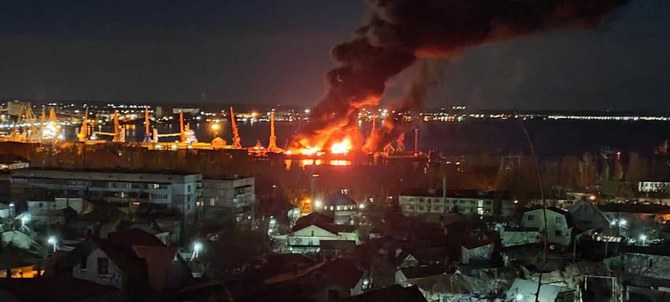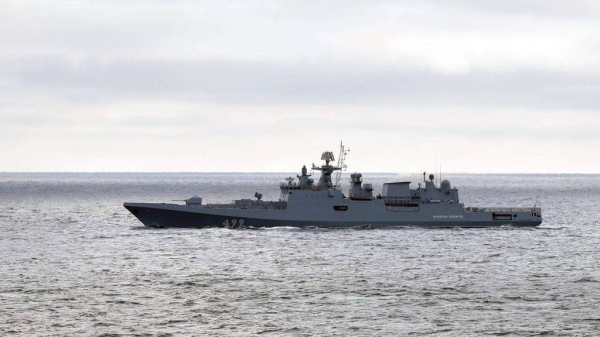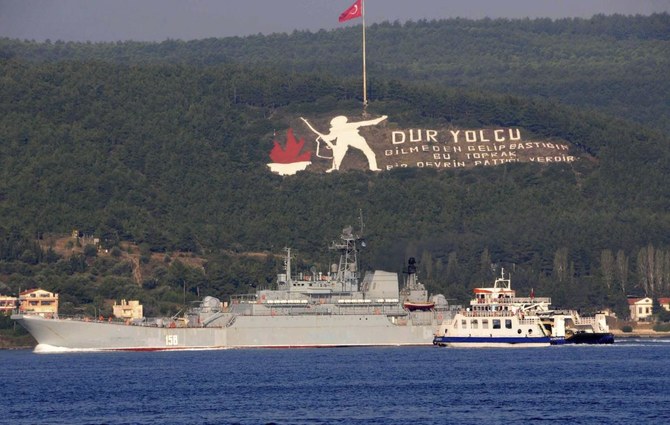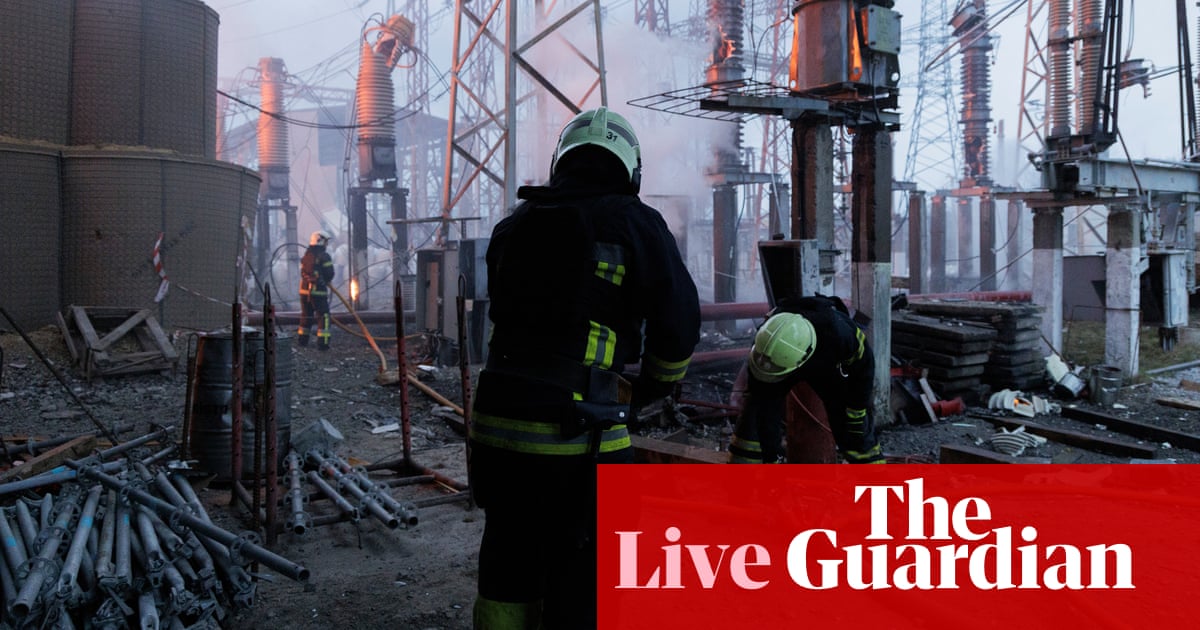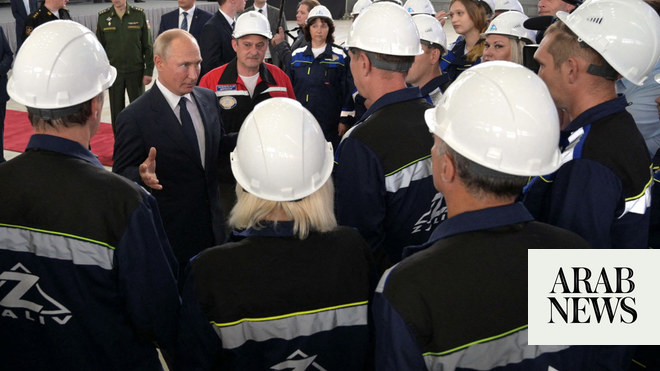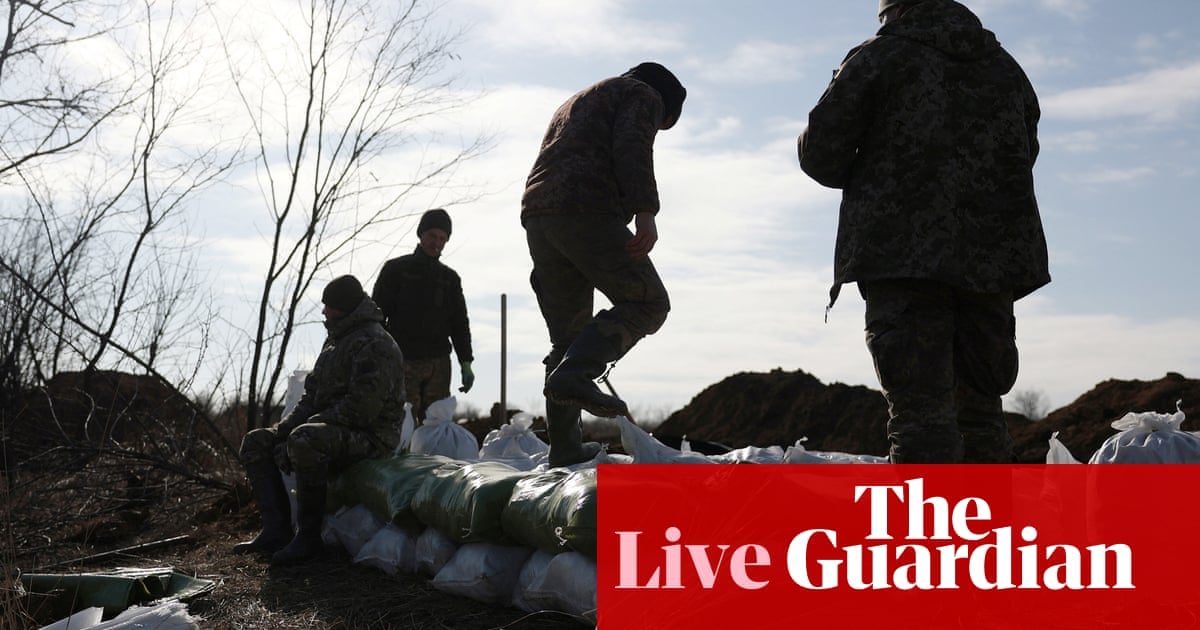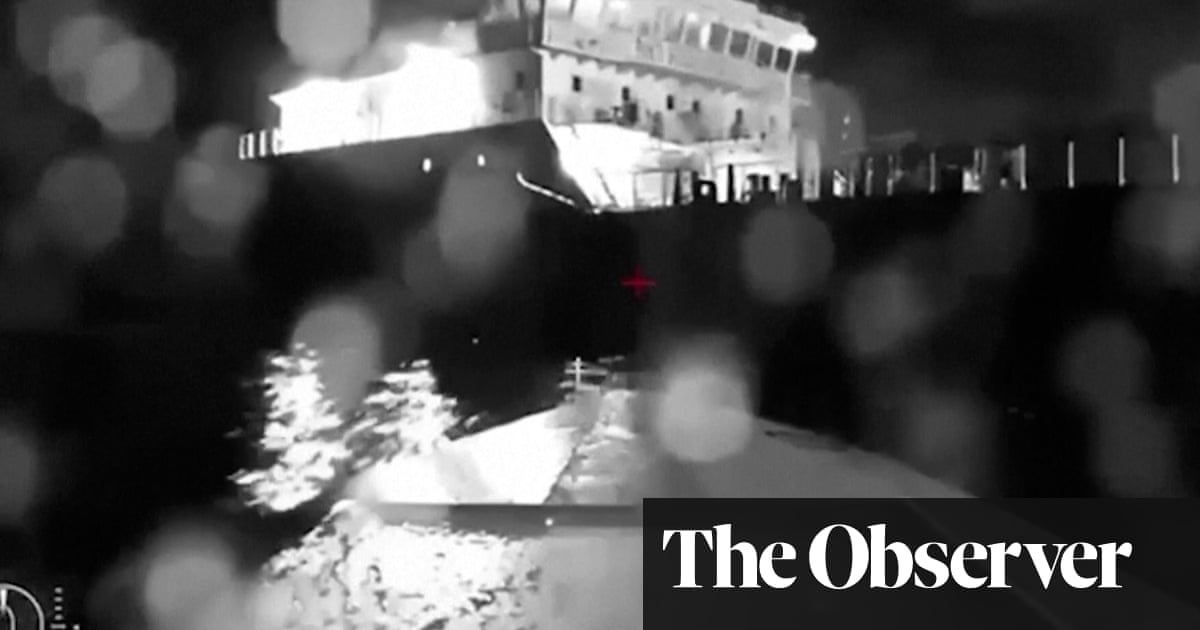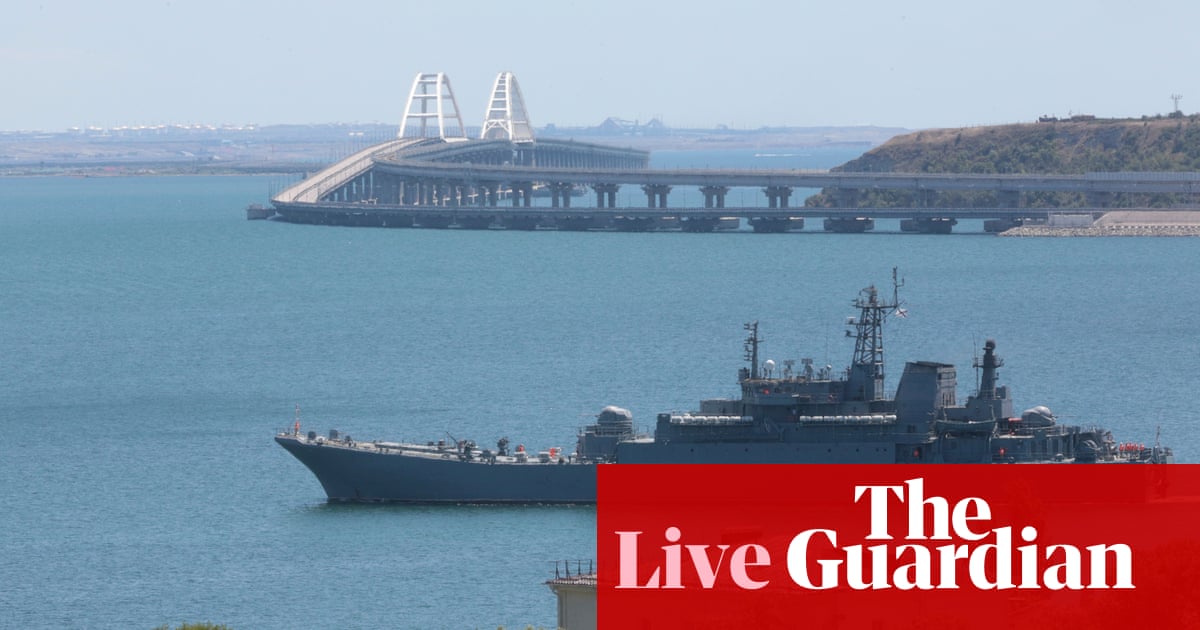
Ukraine claims to have sunk Russian landing ship in drone attack
Ukraine claims to have severely damaged and sunk a Russian landing ship in its latest drone attack against Moscow’s Black Sea fleet.
Ukrainian military intelligence released video on Wednesday that it said showed several naval drones approaching the Ropucha-class large landing ship Cesar Kunikov off the coast of Crimea.
The drones hit the port side of the ship, the agency said in a statement, adding that it “suffered critical holes on the port side [of the hull] and began to sink”.
The Cesar Kunikov is a Project 775 large landing ship that can carry 87 crew members onboard and was active in the conflicts in Syria, Georgia, and Ukraine, the agency said.
Video released on social media also showed a plume of smoke rising from a ship said to be in the Black Sea, and there were reports in local Russian media of a search-and-rescue operation using helicopters under way over the water.
Russian military bloggers, who regularly publish information about incidents before they are confirmed by Russia’s military, also corroborated reports of an attack against the Cesar Kunikov.
If confirmed, the strike would be the second successful operation this month against a Russian warship operating in the Black Sea.
On 1 February, Ukrainian Magura V5 sea drones struck the Russian warship Ivanovets in a sophisticated nighttime attack that showed the vulnerability of Russia’s Black Sea fleet against unmanned naval vessels.
Closing summary
Ukraine claims to have severely damaged and sunk a Russian landing ship in its latest drone attack against Moscow’s Black Sea fleet. Ukrainian military intelligence released video on Wednesday that it said showed several naval drones approaching the Ropucha-class large landing ship Cesar Kunikov off the coast of Crimea.
Rustem Umerov, the Ukrainian defence minister, has outlined Kyiv’s priorities for today’s contact group meeting with partners. “We will focus on increasing defence production, drones, and technologies, as well as preparing for both long-term challenges and solving urgent needs,” he said.
Nato said on Wednesday that Europe was meeting an alliance spending target and the United States needed allies, days after former US president Donald Trump suggested that Washington might not protect countries that did not spend enough. Nato chief Jens Stoltenberg also urged the Republican-controlled US House of Representatives to pass a “vital” multi-billion dollar military aid package for Ukraine, warning lawmakers that China would be emboldened if Russia wins its war.
The Netherlands is joining a military coalition with allies including Britain that will supply Ukraine with advanced drone technology and bolster its offensive capabilities in the war against Russia, the Dutch defence minister said. The pledge from the Netherlands comes in addition to F-16 fighter jets, artillery, ammunition and air defence systems provided by the Dutch to Kyiv, Reuters reports.
The Kremlin on Wednesday denied a Reuters report that Russian president Vladimir Putin proposed a ceasefire in Ukraine to the United States via intermediaries. Asked if the Reuters report that Russia had made peace proposals was true, Kremlin spokesperson Dmitry Peskov said: “No. It is not true.”
The government of neutral Switzerland said on Wednesday it would be ramping up military spending over the coming years, the latest European country to do so in the wake of Russia’s invasion of Ukraine two years ago. President Viola Amherd said that as of 2035, some 20 billion Swiss francs ($22.58 billion) in additional funding would be available, compared to planning before the Ukraine war. Switzerland allocated 1.9 billion francs for defence in 2023, Reuters reported.
Russia’s parliament will vote on 21 February on suspending the country’s participation in the Parliamentary Assembly of the Organization for Security and cooperation (OSCE), Duma speaker Vyacheslav Volodin said on Tuesday. The OSCE, which counts Ukraine, the US and Russia among its 57 members, is the successor to a cold war-era organisation for Soviet and western powers to engage, Reuters reports.
Russia’s air defence systems destroyed nine Ukraine-launched drones over Russia’s Belgorod and Voronezh regions, as well as over the Black Sea, RIA state news agency reported on Wednesday. It cited the Russian defence ministry.
British foreign secretary David Cameron on Wednesday urged US lawmakers to vote for a $95bn security aid package for Ukraine and other allies. “Britain has announced its support package for the next year. The European Union has announced their package for the next year. And I urge members of Congress in the United States who will be looking at this today to vote for the package,” Cameron told reporters during a visit to Bulgaria.
Russian president Vladimir Putin signed a law Wednesday that will allow authorities to confiscate money, valuables and other assets from people convicted of spreading “deliberately false information” about the country’s military, AP reported. The bill sailed through the lower and upper houses of the Russian parliament, and was unanimously endorsed by the upper house last week.
Ukraine will need $9bn over 10 years for its culture and tourism sectors to recover, the United Nations’ cultural agency said on Tuesday, adding that the two-year war had so far cost the country over $19.6bn in tourism revenue. Russia’s full-scale invasion of Ukraine triggered the deadliest conflict in Europe since the second world war, with no sign of an end to the war in sight, Reuters reports.
The EU is proposing to sanction companies in mainland China for the first time as part of its latest measures aimed at shutting down loopholes that allow Russia to route military technology via third countries to its weapons factories. Three companies in mainland China, as well as four in Hong Kong and one in India, are on a 91-page document of companies and individuals who EU member states want to add to a growing sanctions list before the second anniversary of Russia’s invasion of Ukraine.
Germany has met a Nato alliance target to spend 2% of its gross domestic product on defence for the first time since 1992, the dpa news agency reported on Wednesday, as spending ramped up after Russia’s invasion of Ukraine two years ago. The German government is allocating the equivalent of $73.41bn for defence spending in the current year, dpa reported. This is a record figure for Germany in absolute terms and would be 2.01% of GDP.
That’s it from me, Tom Ambrose, and indeed the Ukraine live blog for today. Thanks for following along.
The government of neutral Switzerland said on Wednesday it would be ramping up military spending over the coming years, the latest European country to do so in the wake of Russia’s invasion of Ukraine two years ago.
President Viola Amherd said that as of 2035, some 20 billion Swiss francs ($22.58 billion) in additional funding would be available, compared to planning before the Ukraine war. Switzerland allocated 1.9 billion francs for defence in 2023, Reuters reported.
“The security policy situation is obviously difficult given the current instability, with a war on the European continent, armed conflicts in the Middle East and other flashpoints in the world,” Amherd told a press conference.
Amherd, who is also defence minister, said there were “so many crises” currently, and the plan was partly taking into account lessons drawn from the Ukraine war.
Nato said on Wednesday that Europe was meeting an alliance spending target and the United States needed allies, days after former US president Donald Trump suggested that Washington might not protect countries that did not spend enough.
Nato chief Jens Stoltenberg also urged the Republican-controlled US House of Representatives to pass a “vital” multi-billion dollar military aid package for Ukraine, warning lawmakers that China would be emboldened if Russia wins its war.
Reuters reported:
The transatlantic alliance’s European states would invest a combined total of $380 billion in defence this year, taking their spending as a whole to an estimated 2% of GDP in 2024 compared to 1.85% in 2023, Stoltenberg said.
Trump shocked Europeans on Saturday by implying that he would encourage Russia “to do whatever the hell they want” to Nato allies that did not spend enough. The 31 allies have committed to a target of spending 2% of their output on defence but not all have done so individually.
“I expect 18 allies to spend 2% of their GDP on defence this year,” Stoltenberg told a news conference in Brussels, adding overall military spending was set for another record year after two years of Russia’s full-fledged war against Ukraine.
The number was higher than last year, when 11 Nato members were expected to reach the agreed target.
Rustem Umerov, the Ukrainian defence minister, has outlined Kyiv’s priorities for today’s contact group meeting with partners.
“We will focus on increasing defence production, drones, and technologies, as well as preparing for both long-term challenges and solving urgent needs,” he said.
Lloyd Austin, the American defence secretary, told Kyiv’s allies via videoconference that “we won’t back down” in supporting Ukraine.
The Kremlin keeps on betting that we will all lose interest in Ukraine and that our support will flicker and fade.
But I am more determined than ever, and I know that you are as well.
This contact group remains resolute, undaunted and firm.
He added:
America will continue to support Ukraine’s principled fight against Putin’s imperial aggression. The Kremlin is sinking deeper into its self-inflicted isolation, but this coalition of some 50 countries worldwide is here to roll up our sleeves, and get to work – and our allies and partners continue to shoulder the burden of our shared security.
Austin noted that officials meeting as part of the Ukraine Defense Contact Group today will work on near-term requirements, including its need for more artillery ammunition and air defence missiles.
Summary
Ukraine claims to have severely damaged and sunk a Russian landing ship in its latest drone attack against Moscow’s Black Sea fleet. Ukrainian military intelligence released video on Wednesday that it said showed several naval drones approaching the Ropucha-class large landing ship Cesar Kunikov off the coast of Crimea.
The Netherlands is joining a military coalition with allies including Britain that will supply Ukraine with advanced drone technology and bolster its offensive capabilities in the war against Russia, the Dutch defence minister said. The pledge from the Netherlands comes in addition to F-16 fighter jets, artillery, ammunition and air defence systems provided by the Dutch to Kyiv, Reuters reports.
The Kremlin on Wednesday denied a Reuters report that Russian president Vladimir Putin proposed a ceasefire in Ukraine to the United States via intermediaries. Asked if the Reuters report that Russia had made peace proposals was true, Kremlin spokesperson Dmitry Peskov said: “No. It is not true.”
Russia’s parliament will vote on 21 February on suspending the country’s participation in the Parliamentary Assembly of the Organization for Security and cooperation (OSCE), Duma speaker Vyacheslav Volodin said on Tuesday. The OSCE, which counts Ukraine, the US and Russia among its 57 members, is the successor to a cold war-era organisation for Soviet and western powers to engage, Reuters reports.
Russia’s air defence systems destroyed nine Ukraine-launched drones over Russia’s Belgorod and Voronezh regions, as well as over the Black Sea, RIA state news agency reported on Wednesday. It cited the Russian defence ministry.
British foreign secretary David Cameron on Wednesday urged US lawmakers to vote for a $95bn security aid package for Ukraine and other allies. “Britain has announced its support package for the next year. The European Union has announced their package for the next year. And I urge members of Congress in the United States who will be looking at this today to vote for the package,” Cameron told reporters during a visit to Bulgaria.
Russian president Vladimir Putin signed a law Wednesday that will allow authorities to confiscate money, valuables and other assets from people convicted of spreading “deliberately false information” about the country’s military, AP reported. The bill sailed through the lower and upper houses of the Russian parliament, and was unanimously endorsed by the upper house last week.
Ukraine will need $9bn over 10 years for its culture and tourism sectors to recover, the United Nations’ cultural agency said on Tuesday, adding that the two-year war had so far cost the country over $19.6bn in tourism revenue. Russia’s full-scale invasion of Ukraine triggered the deadliest conflict in Europe since the second world war, with no sign of an end to the war in sight, Reuters reports.
The EU is proposing to sanction companies in mainland China for the first time as part of its latest measures aimed at shutting down loopholes that allow Russia to route military technology via third countries to its weapons factories. Three companies in mainland China, as well as four in Hong Kong and one in India, are on a 91-page document of companies and individuals who EU member states want to add to a growing sanctions list before the second anniversary of Russia’s invasion of Ukraine.
Germany has met a Nato alliance target to spend 2% of its gross domestic product on defence for the first time since 1992, the dpa news agency reported on Wednesday, as spending ramped up after Russia’s invasion of Ukraine two years ago. The German government is allocating the equivalent of $73.41bn for defence spending in the current year, dpa reported. This is a record figure for Germany in absolute terms and would be 2.01% of GDP.
Russian bombing raids killed three people including a child late on Tuesday near Ukraine’s eastern city of Donetsk, the local council said. It reported that the strikes hit nine apartment blocks and a hospital in Selydove, about 20km (12 miles) west of the frontline. Twelve people were also reported injured including four children.
Russian state news said Ukraine launched nine drones over Russia’s Belgorod and Voronezh regions, as well as over the Black Sea. The report used the customary Russian official language that all the drones were intercepted – this was not independently confirmed.
The Ukrainian president, Volodymyr Zelenskiy, has welcomed the US Senate vote that approved $61bn in aid for Ukraine and sent it to the House of Representatives for a vote. “American assistance brings just peace in Ukraine closer and restores global stability, resulting in increased security and prosperity for all Americans and all the free world,” Zelenskiy said.
The Democratic majority leader in the Senate, Chuck Schumer, said he was confident the bill – also providing assistance to Israel and other allies – would pass the House with support from both Republicans and Democrats if there were a vote, and called on House leaders to do the right thing.
The House speaker, Mike Johnson, asked if he planned to put the bill to a vote, said “I certainly don’t” and suggested members were busy with other matters. But Republicans and Democrats in favour of supporting Ukraine could force a vote using a process called a “discharge petition” if enough of them banded together. The US president, Joe Biden, has urged members of the House to ignore the hectoring of Donald Trump and approve the bill.
Russians forces blasted eight settlements and areas of Ukraine’s Sumy region 331 times on Tuesday, local officials said. Explosions were caused by mortars, artillery, a tank, kamikaze drones and other munitions. The communities that reportedly came under fire were Khotinsk, Yunakivsk, Bilopolsk, Krasnopilsk, as well as Myropilsk, Velikopysarivsk, Shalyginsk and Seredino-Budsk. There were no reports of casualties.
Ukraine will need $9bn over 10 years for its culture and tourism sectors to recover, the United Nations’ cultural agency said on Tuesday, adding that the two-year war had so far cost the country over $19.6bn in tourism revenue.
Russia’s full-scale invasion of Ukraine triggered the deadliest conflict in Europe since the second world war, with no sign of an end to the war in sight, Reuters reports.
“The damage continues to increase and the needs for the sector’s recovery continue to grow,” Krista Pikkat, director of culture and emergencies at Unesco, told reporters, adding that the lost revenue to the capital Kyiv alone was $10bn.
In an assessment before the war’s two year anniversary, the Unesco estimated the cost of damage to cultural property at about $3.5bn, up 40% from 2023. It said it had analysed damage to 340 buildings, including museums, monuments, libraries and religious sites.
“International solidarity will be essential to meeting these needs,” the report said. “The implementation of risk prevention measures and the support for the creative industries are also important levers to reduce the estimated long-term impact of the war.”
Russian president Vladimir Putin signed a law Wednesday that will allow authorities to confiscate money, valuables and other assets from people convicted of spreading “deliberately false information” about the country’s military, AP reported.
The bill sailed through the lower and upper houses of the Russian parliament, and was unanimously endorsed by the upper house last week.
The speaker of the lower house, Vyacheslav Volodin, said the measure includes harsher punishment for “traitors who sling mud at our country and our troops” and would “strip those scoundrels of honorary titles, confiscate their assets, money and other valuables.”
Russian officials have used the existing law against “discrediting” the military that covers offenses such as “justifying terrorism” and spreading “fake news” about the armed forces to silence Putin’s critics. Multiple activists, bloggers and ordinary Russians have received long prison terms.




